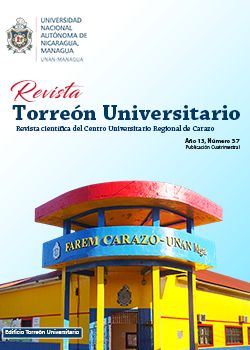Pedagogical accompaniment: feedback to teachers of the National Institute June 21, Santo Tomás, Chontales
DOI:
https://doi.org/10.5377/rtu.v13i37.18154Keywords:
Educational accompaniment, Quality, Teachers, StudentsAbstract
The pedagogical accompaniment strategy implemented by the Ministry of Education arises in response to the need to provide pedagogical assistance to teachers, so that they improve their performance in the development of learning processes and, as a consequence, raise the level of learning achievement of the students. students, is an alternative that seeks quality promotion. This strategy expresses explicitly and implicitly the guidelines of the National Plan to Fight Poverty and for Human Development, in the "more and better education" strategy. Undoubtedly, for significant results to emerge from this, it has implied the execution of a series of actions from budget programming to the hiring of personnel prepared for its execution. All these efforts are focused on preparing teachers to provide an education with quality and human warmth. Hence, the main objective of this strategy is to ensure compliance with the educational model. Meanwhile, this article reflects the main learning experiences offered by pedagogical advice and results of evaluative content of verbal feedback during pedagogical accompaniment. For this, the interview technique and documentary analysis were applied.
Downloads
References
Bautista Lara, M. d. (21 de Agosto de 2017). Planificación de la Educación. Managua: Unan-Managua.
Cruzata-Martínez, A., & Bellido, R. (2018). La tutoría como estrategia pedagógica para el desarrollo de competencias. Propósitos y Representaciones,. https://doi.org/http://dx.doi.org/10.20511/pyr2018.v6n2.252
Cuenca, C., Montero, M., Ames , A., & Rojas , R. (2014). Hacia una propuesta de criterios de buen desempeño docente Estudios que aportan a la reflexión, al diálogo y a la construcción concertada de una política educativa. Consejo Nacional de Educación. https://repositorio.iep.org.pe/handle/IEP/703
Darling-Hammond, L. (21 de Agosto de 2002). Teacher quality and student achievement: A review of state policy evidence. Managua, Nicaragua. https://doi.org/10.14507/epaa.v8n1.2000
Hernández Sampieri, R., Fernández, C., & Baptista, P. (2014). Metodología de la Investigacion. Mexico: McGrawHill.
Lawsy, K., & McLeod, R. (2014). Case study and grounded theory: Sharing some alternative qualitative research methodology with systems professionals. . Artículo presentado a la 22nd International Conference of Systems Dynamics(V), 29.
LEY N°. 582: Ley General de Educación . (03 de Aagosto de 2006). Managua, Nicaragua.
Mario, W. (2014). Towards coherence between classroom assessment and accountability. Chicago: University of Chicago Press.
Melgar, R. (2020). Modelos de asesoría pedagógica y su incidencia en las propuestas de asesoramiento para la educación básica en México. Avances En Supervisión Educativa,. https://doi.org/10.23824/ase.v0i34.692
Melmer, R., Burmaster, E., & James, T. (2008). Attributes of effective formative assessment. Washington, DC:: Council of Chief State School Officer. https://www.dpi.nc.gov/docs/accountability/educators/fastattributes04081.pdf
MINED. (2021-2026). Plan de Educación 2022-2026. Managua, Nicaragua.
Ministerio de Educación. (21 de Julio de 2021). Actualización del profesorado niacaragüense. Managua, Nicaragua.
Piñuel, R., & Gaitán, C. (2010). Investigación, comunicación y universidad. Salamanca: Comunicación Social.
Rosales, J., & Lazo, C. (21 de Julio-septiembre. de 2010). Acompañamiento pedagógico y profesionalización docente:sentido y perspectiva. Ciencia y Sociedad. XXXV, 521-541. Número 3. https://www.redalyc.org/pdf/870/87020009007.pdf
Solís, J. (18 de octubre de 2013). El análisis documental como eslabón para la recuperación de información y los servicios. http://www.monografias.com/ trabajos14/analisisdocum/analisisdocum.shtml
Downloads
Published
Issue
Section
License
Copyright (c) 2024 National Autonomous University of Nicaragua, Managua

This work is licensed under a Creative Commons Attribution-NonCommercial-NoDerivatives 4.0 International License.
The authors who publish in this journal agree to the following terms.
- The author or authors of the articles, essays or research grant the National Autonomous University of Nicaragua, Managua (UNAN-Managua) the editing rights (copyright) of the submitted work, therefore the University has the exclusive right to publish the article for the entire copyright period.
- These copyrights/authors authorize Torreón Universitario Magazine and the University to edit and disseminate/publish the article in said Magazine, including printed and electronic reproduction, storage, retrieval and any other type of publication, and sources of secondary information as services. of summaries and databases, they also empower it to protect the article against unauthorized use for dissemination by printed or electronic media (PDF, HTML, EPUB, XML or others).
License for use of content
The magazine uses the Creative Commons Attribution-NonCommercial-NoDerivs 4.0 International License.
Under this statement:

This journal is licensed under a Creative Commons Attribution-NonCommercial-NoDerivatives 4.0 International License. It can be copied, distributed and transmitted publicly as long as the author and source are cited (Revista Torreón Universitario), it should not be modified or used for any commercial purpose. The full license can be found at http://creativecommons.org/licenses/by-nc-nd/4.0/.



